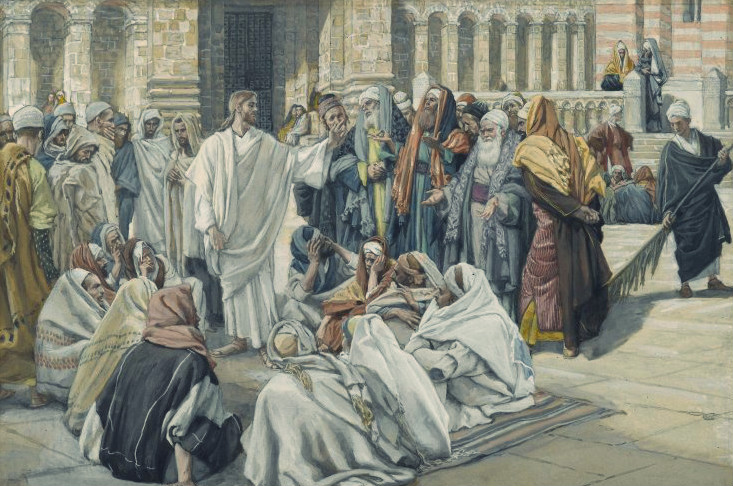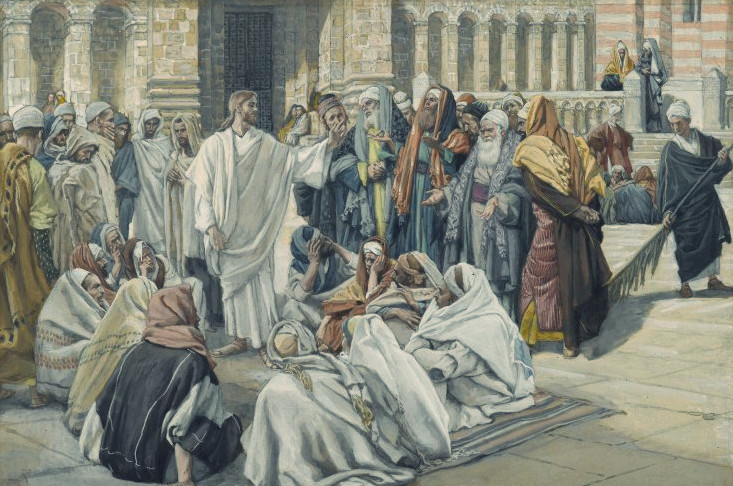那時候,耶穌對民眾和眾門徒講論說:「禍哉,你們經師和法利塞假善人!因為你們捐獻十分之一的薄荷、茴香和蒔蘿,卻忽視了法律上最重要的公義、仁慈與信義;這些固然該作,那些也不可放過。瞎眼的嚮導!你們濾出蚊蚋,卻吞下了駱駝。
「禍哉,你們經師和法利塞假善人!因為你們洗擦杯盤的外面,裏面卻滿是劫掠與貪慾。瞎眼的法利塞人!你先應清潔杯的裏面,好叫它外面也成為清潔的。」
瑪竇福音 23:23-26

天主吩咐過司祭和肋未人,人民十分之一的收成該獻於聖所,並歸於上主。法利塞人只關注這些事情,卻忽略了天主更重要的教導。他們嚴格仔細地計算穀物十分之一的奉獻,卻沒有在交易中履行正義、沒有憐憫窮人、沒有重視對上主的信德,這些其實都是更重要。忽略什一之物比忽略仁義的罪疚輕得多,所以主耶穌斥責他們:「瞎眼的嚮導!你們濾出蚊蚋,卻吞下了駱駝。」
可是避免有人聽見了以為可忽視什一之物的奉獻,耶穌補充說:「這些(公義、仁慈與信義)固然該作,那些(捐獻十分之一的薄荷、茴香和蒔蘿)也不可放過。」這些話表明天主的一切誡命,無論最大還是最小的,都該履行。這也提醒人不要以為捐獻了地上的產物就不會犯罪;其實除非他們小心讓自己遠離罪惡,否則他們的奉獻對他們毫無益處。
出於同樣的理由,耶穌責備法利塞人虛偽,對外面的人和在家顯露不同臉容。祂並不是指責他們洗擦杯盤的認真,而是他們表裡不一,因此耶穌形容他們「好像用石灰刷白的墳墓;外面看來倒華麗,裏面卻滿是死者的骨骸和各樣的污穢」。祂譴責人賣弄無謂的審慎,卻忽視執行有益的道德,因用的是杯盤的裡面,如果充滿罪污,清洗外面又有什麼好處呢?我們需要的是內心良知的純潔,那麼身體也就可能變得潔淨。
Jesus said, “Woe to you, scribes and Pharisees, you hypocrites. You pay tithes of mint and dill and cummin, and have neglected the weightier things of the law: judgment and mercy and fidelity. But these you should have done, without neglecting the others. Blind guides, who strain out the gnat and swallow the camel!
“Woe to you, scribes and Pharisees, you hypocrites. You cleanse the outside of cup and dish, but inside they are full of plunder and self-indulgence. Blind Pharisee, cleanse first the inside of the cup, so that the outside also may be clean.”
Matthew 23:23-26
The Lord had commanded, that for the maintenance of the Priests and Levites, whose portion was the Lord, tithes of every thing should be offered in the temple. Accordingly, the Pharisees (to dismiss mystical expositions) concerned themselves about this alone, that these trifling things should be paid in, but overlooked other weightier things. He charges them then with covetousness in exacting carefully the tithes of worthless herbs, while they neglected justice in their transactions of business, mercy to the poor, and faith toward God, which are weighty things. And because it was much less guilt to omit the tithing of herbs than a duty of benevolence, the Lord derides them, "You blind guides, which strain out a gnat, and swallow a camel."
But because it was possible that some, hearing the Lord speak thus, might thereupon neglect paying tithes of small things, He prudently adds, "These things ought you to have done, (i.e. justice, mercy, and faith,) and not to leave the others undone, (i.e. the tithing of mint, anise, and cummin.)" In these words the Lord shows that all the commandments of the Law, greatest and least, are to fulfilled. They also are refuted who give alms of the fruits of the earth, supposing that doing this they cannot sin, whereas their alms do them no good unless they are careful to keep themselves from sin.
In different words, but for the same reason as before, Jesus reproves the hypocrisy and dissimulation of the Pharisees, that they showed one face to men abroad, but wore another at home. He means not here, that their scrupulousness respecting the cup and the platter was of any importance, but that they affected it to pass off their sanctity upon men; which is clear from His adding, "but inwardly you are full of ravening and uncleanness." He therefore is reproving those who, pursuing an ostentation of useless scrupulosity, neglected the discharge of useful morality. For it is the inside of the cup that is used; if that be foul, what good is it to cleanse the outside? And therefore what is needed is purity of the inner conscience, that those things which are of the body may be cleansed.
References:
Catena Aurea (St. Thomas Aquinas)
Commentariorum In Evangelium Matthaei (St. Jerome)
In Evangelium Matthaei Commentarius (St. Hilary of Poitiers)
Origen
St. Remigius of Auxerre
